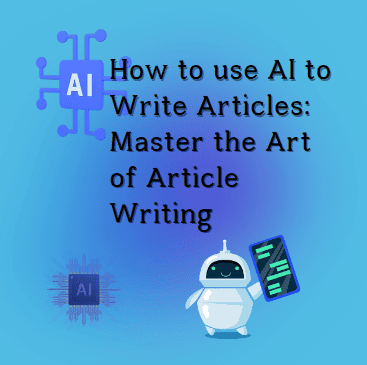Could AI Writing Tools Cost You a Google Penalty? The Ethical Lines You Need to Know

Introduction
Have you heard rumours about Google penalizing websites and blogs using AI writing tools like ChatGPT? These rumours likely sent a chill down your spine as a blogger or writer. Could your use of text generation tools like Copy AI, hailed as one of the best AI assistants, suddenly cost you your Google rankings?
This sobering possibility raises urgent ethical questions for anyone creating content in the AI age. Many businesses now use AI essay writers and paraphrasing tools to quickly generate blog posts and articles. But without caution, overreliance on AI could lead to a Google penalty, destroying their site’s hard-won rankings.
Can we truly trust these miraculous AI writing tools to act ethically? While tools like Copy AI show promise, AI lacks human sense and judgment. AI could unknowingly plagiarize sources or generate harmful, biased content without careful oversight.
As a responsible content creator, you need to know where the ethical lines lie when using the latest AI text generators and assistants. In this article, we’ll explore best practices for using AI writing tools ethically, minimizing the risks of a Google penalty, and what the future may hold for AI in content creation. Let’s dive in!
Best Practices for Using the Best AI Tools Ethically
As an AI policy advisor, I’ve worked closely with leading companies to develop ethical frameworks around text generation. Based on my experience, here are some best practices:

Choose trusted, transparent AI vendors
Not all AI tools are created equal when it comes to ethics. Look for vendors that invest heavily in developing safeguards against bias, plagiarism and toxicity. Transparent AI companies will openly share details about their training data and methods.
Customize prompts carefully
How you frame the prompt is critical to avoiding plagiarism and copyright violations. Get specific with facts, figures and context rather than just topic keywords. Ask for original analogies and metaphors. Test variations to see the impact.
Thoroughly review and edit
Never publish AI content as-is. Just like with human writers, errors occur. Review for plagiarism, accuracy, spelling, grammar and unintended bias. Maintain authorial discretion to accept, reject or modify text as needed.
Adopting these practices requires extra work but helps ensure your AI-assisted content meets the highest ethical standards. It also shows good faith efforts if questioned by Google or other authorities. Responsible AI use that puts quality first will serve you well in the long run.
How to Minimize Risk of Google Penalties
With over a decade in SEO, I’ve seen many Google updates come and go. Recent core updates clarify that focusing on E-E-A-T (expertise, experience, authoritativeness, trustworthiness) and topical authority is key. AI can help but should not replace original, high-quality content.
Based on my experience getting client sites to rank in 2022 and beyond, here are tips:

Prioritize originality over quantity
Churning out repetitive or copied content with AI will penalise you faster than ever. Google’s systems are highly advanced at detecting duplicate content and scraping. Produce truly unique perspectives.
Focus on value, not keywords
Stuffing articles with keywords will backfire. Instead, focus on delivering genuine value and insight to human readers. Let keywords flow naturally.
Follow Google’s quality guidelines
Familiarize yourself with Google’s advice on high-quality content and ethical practices. Make these your guiding principles and AI will enhance rather than undermine them.
Use AI as an aid, not a replacement
AI should assist and augment your human creativity, not replace it. Maintain full authorial discretion over final published content.
AI wisely applied alongside smart SEO can help you gain Google’s trust. But over-reliance without human oversight invites penalties. Stay focused on value and quality, not quantity, and your use of AI tools will drive growth rather than risk.- The Future Role of the Best AI Tools in Content Creation.
Key Takeaways for Using AI Writing Tools Responsibly
Maintain Oversight and Control over Final Content
- Thoroughly review AI-generated text before publishing – do not blindly accept suggestions
- Apply your editing and modifications to ensure quality and avoid plagiarism
- As the human creator, you must stay in full control – AI is an assistant, not the author
Customize Prompts to Guide AI Ethically
- Frame prompts carefully to avoid leading AI to plagiarize or generate harmful content
- Specify facts to make the content original rather than just supplying a topic
- Test different prompts and select the best, most ethical output
Produce High-Value Content, Not Just Maximum Volume
- Focus on creating truly useful, insightful content that goes beyond keywords
- Well-researched, high-quality content earns trust; churned-out repetitive content damages it
- Slow down if needed to ensure you can carefully oversee AI-assisted drafting
Maintain Transparency About Your AI Use
- Be upfront about using AI tools in your content creation process if questioned
- Demonstrate the value-add of AI as well as your oversight measures
Related Tips for Ethical AI Content Creation
- Adopt a Mix of AI and Human Writing
- Augment, but don’t replace your own writing with AI suggestions
- Bring your own expert opinions, analysis and storytelling to topics
Look for AI Vendors with Strong Ethics Policies
- Scrutinize how transparent vendors are about training data and methods
- Opt for vendors taking clear steps to minimize plagiarism and bias risks
Stay Vigilant As Risks Evolve
- Keep an eye out for new best practices as AI capabilities advance
- Monitor any new Google guidelines on AI-generated content
FAQ
Is using AI writing tools unethical?
Not inherently, but careless use without oversight invites ethical issues. With proper human guidance, AI can be a useful assistant.
How much AI use will trigger a Google penalty?
Google has not defined specific limits yet. However, overreliance without original analysis/insight is risky. Use AI ethically to enhance quality.
What’s the best way to guide AI writing ethically?
Customize prompts with original facts/context, review output thoroughly, and maintain authorial discretion over final drafts. Prioritize value over volume.
Should I tell readers if I used AI writing assistance?
Transparency is encouraged but not yet required. Ensure published content meets your quality standards regardless of AI use.
What if AI writes something harmful or biased?
This demonstrates why thorough human review is critical before publishing. Edit, reject or rewrite any concerning passages yourself.






